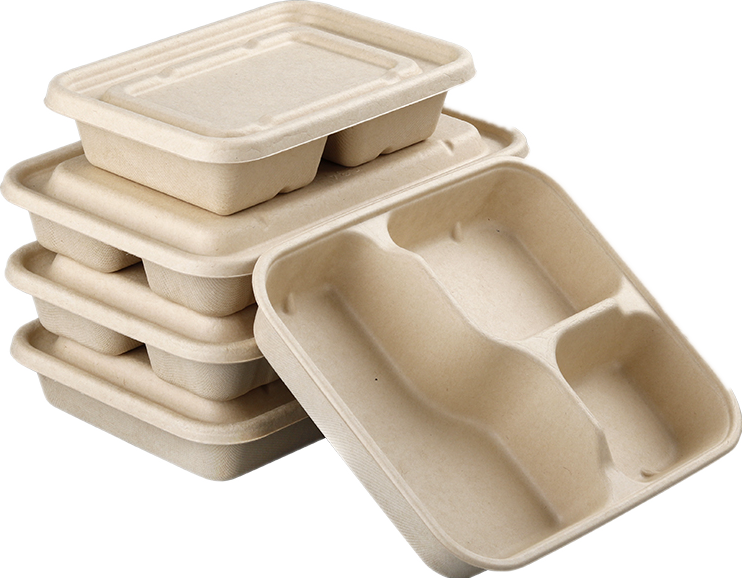Different Types of Disposable Tableware
Source: Publish:2022-05-10
Whether you want to make a positive impression on your guests or change the environment, choosing the right type of tableware is important.
Disposable meals come in several different material types.
Choosing the best tableware for your business will depend on the food you serve, your environmental goals and your budget.
Here's a quick overview of the different types of disposable tableware:
Material Type | Density | Disposal | Heat Tolerance |
Polyproylene (Plastic Number 5) | Available in: | Single Use Recyclable** | Up to 250°F* |
Polystyrene (Plastic Number 6) | Available in: | Single Use Recyclable** | Up to 180°F* |
Plant Starch Material (PSM) | Varies by Manufacturer | Single Use | Up to 200°F* |
CPLA | Available in: | Single Use Compostable*** | Up to 185°F* |
Molded Fiber | Varies by Manufacturer | Single Use Compostable*** | Up to 250°F* |
Bamboo | Varies by Manufacturer | Single Use Compostable*** | Up to 158°F* |
Wood | Varies by Manufacturer | Single Use Compostable | Up to 200°F* |
Whether you want to make a positive impression on your guests or change the environment, choosing the right type of tableware is important.
Disposable meals come in several different material types.
Choosing the best tableware for your business will depend on the food you serve, your environmental goals and your budget.
Here's a quick overview of the different types of disposable tableware:
Depending on your business needs, needs and budget, each type of tableware material can offer advantages or disadvantages to your business.
Disposable plastic cutlery
The most common disposable tableware is made of plastic. Plastic cutlery is made of polypropylene or polystyrene.
Polypropylene
Benefit:
Polypropylene is the cheapest option for disposable tableware.
Polypropylene is the most flexible choice for plastic cutlery. It can withstand maximum twisting and bending before breaking.
Polypropylene has a heat resistance of 250°F* before deformation.
Polypropylene meals are available in light, medium and heavy duty, and in a variety of lengths and sizes.
shortcoming:
Polypropylene is recyclable, but acceptance will vary by state and facility. Before handling any product, check with your commercial mover to confirm that they accept polypropylene cutlery in your area.
Polypropylene is not compostable.
Plant Starch Material (PSM)
PSM tableware is also called plant starch tableware. PSM cutlery is made from a combination of plastics such as polypropylene and vegetable starch materials such as corn and potato starches.
Compared to polypropylene or polystyrene plastic tableware, PSM is more expensive, but saves costs compared to other eco-friendly disposable tableware.
Benefit:
PSM cutlery is typically made from 20-30% plastic and 70-80% plant material. The plastic composition gives it the density and strength to bend before breaking.
PSM has a heat resistance of 200°F* before deformation.
Shortcoming:
PSM has lost popularity in recent years as other tableware options have advanced.
Unlike polypropylene or polystyrene, PSM cutlery does not use light, medium or heavy weight as an indicator of cutlery density or size. The strength of PSM cutlery will depend on the size and length of the product and will vary by manufacturer.
PSM cutlery is not compostable as 20-30% of it is made of plastic material that won't break down.
PSM cutlery is not recyclable.
Environmentally friendly disposable tableware
Cutlery that can be composted at home or in a commercial facility will leave a smaller footprint on the planet and be considered more environmentally friendly.
More environmentally friendly disposable tableware options include: CPLA (Crystalline Polylactic Acid), Bamboo, Molded Fiber and Wood.
Crystalline Polylactic Acid (CPLA)
CPLA is also known as crystalline polylactic acid, and is sometimes called PLA.
CPLA is more expensive than single-use plastic cutlery, but is the cheapest eco-friendly option.
Benefit:
CPLA cutlery is certified compostable and can be composted in commercial composting facilities within 60 - 180 days.
CPLA has a heat resistance of 185°F* before deformation.
It is available in light, medium and heavy duty, and in various lengths and sizes.
shortcoming:
CPLA is very hard and will break under extreme pressure.
Bamboo
Bamboo is a rapidly renewable resource, making it an excellent choice for disposable tableware.
Bamboo is more expensive than plastic and CPLA cutlery. Bamboo is priced similar to molded fiber.
Benefit:
Bamboo cutlery is certified compostable.
It's smooth and lightweight.
Bamboo has a heat resistance of 200°F*.
If you're looking to showcase your sustainability efforts, bamboo tableware can make it clear to your customers that you've considered the entire product life cycle when making product decisions.
Shortcoming:
Bamboo tableware does not use light, medium or heavy weight as an indicator of tableware density or size. The strength of bamboo cutlery will depend on the size and length of the product and will vary from manufacturer to manufacturer.
There is no standard color for bamboo tableware. Color may vary per piece.
Molded fiber
 Molded fibers are made from a blend of recycled cardboard, newsprint, sugar cane, wheat fibers and other natural plant materials.
Molded fibers are made from a blend of recycled cardboard, newsprint, sugar cane, wheat fibers and other natural plant materials.
The price of molded fiber is similar to that of bamboo.
Benefit:
Molded fiber cutlery is certified compostable and can be composted in commercial composting facilities within 60 - 180 days.
Molded fibers are heat resistant to 250°F*.
For facilities like prisons or hospitals that require safe (non-sharp) utensils, molded fibers are the best choice.
Shortcoming:
Molded fiber is the least durable cutlery option.
Molded fiber cutlery will soften if left in liquid for too long.
Molded fiber cutlery does not use light and medium
